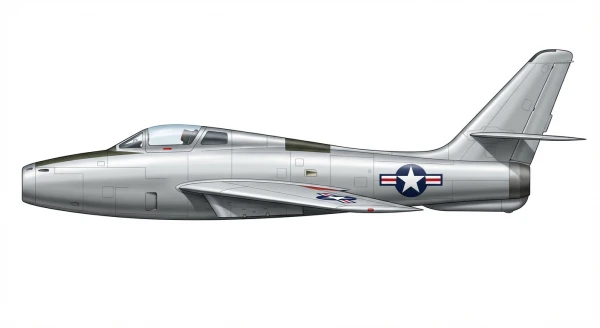F-84F Thunderstreak
Summary
| Category | Combat Aircraft |
| Origin country | 🇺🇸 United States |
| Manufacturer | Republic |
| First flight | 3 June 1950 |
| Year introduced | 1954 |
| Number produced | 3428 units |
| Average unit price | $1.6 million |
Description
In 1948, development of a swept wing version of the F-84 Thunderjet commenced to enhance performance. The last production F-84E was modified with a swept tail, a new wing featuring a 38.5-degree leading edge sweep and 3.5 degrees of anhedral, and powered by a J35-A-25 engine. Designated XF-96A, this prototype first flew on 3 June 1950. Despite limited initial performance gains, the aircraft was ordered into production in July 1950 as the F-84F Thunderstreak. The USAF arranged for the British Armstrong Siddeley Sapphire turbojet engine to be produced under license in the United States as the Wright J65 to improve high-altitude performance. To accommodate the larger J65 engine, the YF-84Fs and subsequent production F-84Fs were designed with a vertically stretched fuselage, resulting in an oval cross-section for the air intake. Tooling commonality with the straight-wing F-84 Thunderjet was limited to fifteen percent. Early production encountered delays; the F-84F utilized press-forged wing spars and ribs, production priority for which was given to the Boeing B-47 Stratojet. Additionally, the YJ65-W-1 engine was considered obsolete upon delivery, and the improved J65-W-3 variant did not become widely available until 1954. When the first production F-84F finally flew on 22 November 1952, it incorporated a different canopy design and had airbrakes positioned on the sides of the fuselage, unlike the prototype. Early models exhibited control and stability issues, including accelerated stall pitch-up and poor turning ability. These issues were addressed and improved starting with Block 25 aircraft. The F-84F was not officially declared operational until 12 May 1954.
The Republic F-84F Thunderstreak incorporates a swept-wing design. To accommodate the larger Wright J65 engine (a license-built Armstrong Siddeley Sapphire), the YF-84F prototypes and production F-84Fs feature a vertically stretched fuselage, resulting in the air intake having an oval cross-section. The first production F-84F featured a canopy that opened upwards and backwards via hydraulic rams and a pivoted lever arm, and airbrakes on the sides of the fuselage instead of the bottom. Block 25 aircraft and later incorporated a hydraulically powered one-piece stabilator to improve handling, while some earlier models were retrofitted with spoilers for enhanced high-speed control.
The F-84F Thunderstreak was equipped with six .50 in (12.7 mm) Browning M3 machine guns, with four mounted in the nose above the intake and two in the wing roots, for a total of 1,800 rounds. For ground attack missions, it could carry up to 6,000 lb (2,727 kg) of external stores, including rockets and bombs. The F-84F was also capable of carrying one Mark 7 nuclear bomb. Tactical Air Command aircraft were equipped with the Low-Altitude Bombing System (LABS) for the delivery of nuclear weapons.
Operational tests concluded in November 1954, deeming the F-84F satisfactory and exhibiting better characteristics than the straight-wing F-84G. However, early failures of the J65 engine resulted in a grounding of the fleet in 1955. The J65 engine also proved susceptible to flameouts in heavy precipitation, which impacted operational readiness. Phasing out of the F-84F from active USAF service began as early as 1954 and was largely completed by 1958. Amid rising international tensions, the fleet was reactivated in 1961. However, corrosion issues subsequently grounded the fleet again in 1962, necessitating extensive repair programs. Stress corrosion eventually led to the retirement of Air National Guard F-84Fs by 1971. The F-84F was formally retired from active USAF service in 1964, replaced primarily by the F-100 Super Sabre. The RF-84F reconnaissance variant was replaced by the RF-101 Voodoo in active units, continuing in the Air National Guard until 1971. The Hellenic Air Force was the last operator of operational F-84s and RF-84Fs, retiring them in 1991. The F-84F was widely exported to NATO member countries and other allies, including Belgium, Denmark, France, West Germany, Greece, Italy, the Netherlands, Norway, Taiwan, and Turkey, and briefly operated by Israel using ex-French aircraft. One air-to-air engagement involving the F-84F is recorded, where Turkish Air Force F-84Fs intercepted and downed two Iraqi Il-28 bombers that had entered Turkish airspace in 1962.
Main Variants:
-
YF-84F: Two swept-wing prototypes initially designated YF-96.
-
F-84F Thunderstreak: The swept-wing version powered by a Wright J65 engine, with Tactical Air Command aircraft equipped with the Low-Altitude Bombing System for nuclear bomb delivery.
-
GRF-84F: Twenty-five RF-84Fs converted for carriage and launch from the bomb bay of a GRB-36F bomber as part of Project FICON.
-
RF-84F Thunderflash: Reconnaissance version of the F-84F with air intakes relocated to the wing-roots to allow for camera installation in the nose, featuring computerized controls for camera settings, a periscope, and a voice recorder.
-
RF-84K Thunderflash (FICON): RF-84F variant with a retractable probe for hookup with GRB-36D carriers and modified tailplanes, 25 of which were redesignated from RF-84F.
Technical specifications
| Version: F-84F Thunderstreak | |
|---|---|
| Crew | 1 pilot |
| Maximum speed | 1060 km/h (659 mph) |
| Wing area | 30.2 m² (325.0 sqft) |
| Wingspan | 10.2 m (33.6 ft) |
| Height | 4.6 m (15.0 ft) |
| Length | 13.2 m (43.4 ft) |
| Service ceiling | 12,000 m (39,370 ft) |
| Empty weight | 6,789 kg (14,967 lbs) |
| Max. takeoff weight | 12,247 kg (27,000 lbs) |
| Climb rate | 42.0 m/s (137.8 ft/s) |
| Powerplant | 1 x turbojet Wright J65-W-3 delivering 3275 kgf each |
| Ejection seat | Martin-Baker Mk 5 |
Current operating countries
All operators
Armament
Bombs payload:
- Nuclear Mark 7


